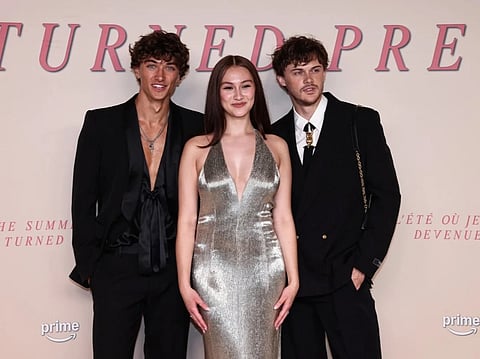The Summer I Turned Pretty review — Glossy, predictable, but weirdly addictive OTT show
Here's why I am oddly invested in Jeremiah, Conrad, and Belly’s convoluted love triangle

Dubai: This year’s most polarising show, The Summer I Turned Pretty, has quietly become one of my biggest guilty pleasures. My 14-year-old daughter rolled her eyes when I admitted that I am oddly invested in the latest third season of Jeremiah, Conrad, and Belly’s convoluted love triangle.
But let’s be honest — for someone who has grown up on a steady diet of Bollywood films and romcoms with grown men dancing around trees, this sun-drenched teen drama is right up my street.
At its core, the series is as glossy and escapist as television gets. The setup is irresistible: a dreamy summer home, two handsome brothers, their childhood friend Belly, and mothers who also happen to be besties. The tragedy that shadows them — the boys’ mother’s death from cancer — gives the story a layer of grief and trauma. But make no mistake: hormones, heartbreak, and endless yearning take center stage.
As a mother of a teenage daughter, I found myself oddly sympathetic to the parental panic about Belly considering marriage to Jeremiah before she’s even processed her brief fling with Conrad.
Conrad, ever brooding, seems weighed down by a promise made to his cancer-stricken mother to take care of his brother. If I didn’t know better, I’d think this setup was borrowed from Karan Johar — all family drama, teary promises, and perfect summer houses. There’s melodrama, there’s angst, and there’s just enough gloss to keep it binge-worthy.
What really keeps The Summer I Turned Pretty ticking is the sheer magnetism of its characters, even when their decisions make you want to scream into your silk pillow. Conrad gives Belly those long, tortured puppy-dog looks that would melt any teenager’s heart. Jeremiah, with his golden curls and surfer-boy vibes, is more fantasy than reality, but still magnetic in his own way. And Belly herself, though often frustrating in her indecision, feels painfully real to anyone who remembers the messy blur of adolescence.
The situations the show throws at us often border on ludicrous. A teen wedding plan with no budget for cake? Check. A dramatic love confession timed right before graduation? Of course. Characters making choices that no sensible person would? Absolutely.
And yet, all of this unfolds in a haze of soft lighting, beach sunsets, and impossibly perfect wardrobes. That’s the magic trick: the story doesn’t have to be logical when it looks this good.
Are these characters dumb, annoying, and implausibly privileged? Without question. But they are also gorgeous, sun-kissed, and impossibly easy to watch. That’s the paradox: the writing may be predictable, the twists painfully obvious, but the aesthetics and emotions make it compelling.
In fact, the show thrives on “pretty privilege” — the idea that beauty can excuse almost anything. And in this case, it does.
The final episode, with Belly in France after breaking off her wedding, gestures at a self-discovery arc. It’s neat, it’s glossy, it’s shallow — and it works.
The show isn’t trying to reinvent television, and it doesn’t need to. It understands its audience: teens and adults alike who want to feel swept up in a world where problems are magnified, emotions are raw, and everyone is devastatingly pretty.
The Summer I Turned Pretty may not be riveting in the traditional sense, but it is dangerously watchable. Sometimes, pretty faces and pretty problems are enough.
PS: For die-hard The Summer I Turned Pretty fans, here’s something to look forward to — a feature film adaptation is in the works.
Don't Miss It!
The Summer I Turned Pretty is streaming on Prime Video in the UAE
Sign up for the Daily Briefing
Get the latest news and updates straight to your inbox






